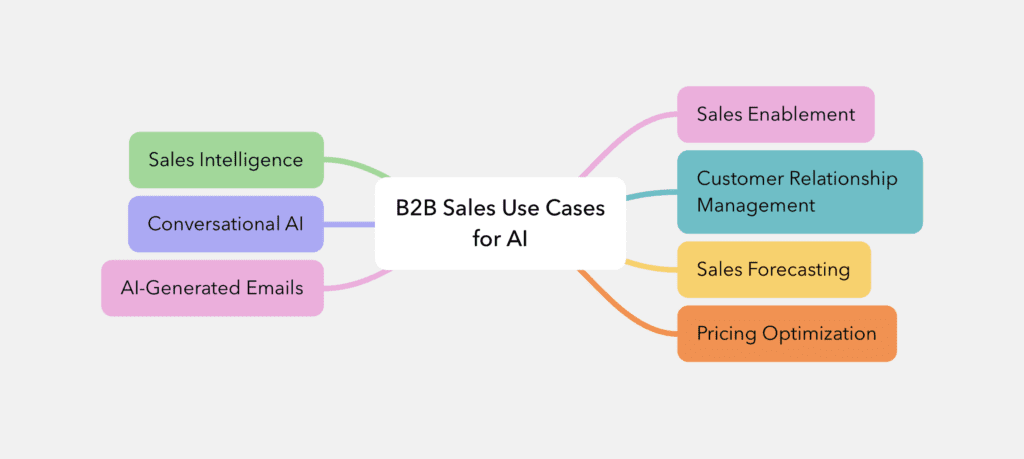Artificial Intelligence (AI) is poised to revolutionize the B2B Sales function in 2023. While Generative AI has captured the imagination of Go-To-Market teams, the impact of AI will go much beyond LLMs such as ChatGPT, Bard, and LaMDA.
In our last post, we explored the B2B Sales patterns that make it a great fit for AI and the types of AI that can help sales teams better understand their prospects, improve the buying experience, and drive more sales.
In this post, we look at the most impactful B2B use cases for AI and some example products that map to each of these use cases.
Common B2B Sales Use Cases for AI
AI-powered tools can help B2B sales teams improve sales productivity by automating time-consuming tasks thus freeing up sales reps to focus on high-value activities. Here are some common use cases:

- Sales Enablement: AI can help B2B sales teams with sales enablement by automating and optimizing tasks such as content creation, sales training, and sales coaching. AI-powered tools can provide personalized training and coaching recommendations, identify knowledge gaps, and suggest relevant content for sales reps, resulting in more effective sales enablement programs. Some examples of companies that offer AI-based sales enablement tools are Highspot, Seismic, and Showpad.
- Customer Relationship Management (CRM): AI-powered CRM solutions help B2B sales teams by automating and optimizing tasks such as lead scoring, sales forecasting, and customer engagement. AI algorithms can analyze customer data and identify trends and patterns, allowing sales teams to personalize their outreach and anticipate customer needs. This can lead to stronger customer relationships, increased sales, and improved efficiency in the sales process. Salesforce, Zoho CRM, and HubSpot are some examples of companies that offer AI-powered CRM solutions.
- Sales Forecasting and Pipeline Management: AI can help B2B sales teams with sales forecasting by analyzing historical sales data, market trends, and customer behavior to predict future sales. AI algorithms can identify patterns and trends that may not be visible to humans, providing more accurate and reliable sales forecasts. This information can help sales teams make more informed decisions about resource allocation, inventory management, and sales strategies, resulting in increased revenue and improved efficiency in the sales process. Additionally, AI-powered sales forecasting can provide real-time updates and recommendations, allowing sales teams to adjust their strategies as needed. Clari, Aviso, and InsightSquared are some examples of companies that offer AI-powered sales forecasting and pipeline management tools.
- Pricing Optimization: AI can help B2B sales teams with pricing optimization by analyzing customer data, market trends, and competitor pricing to identify optimal pricing strategies. AI algorithms can identify patterns in customer behavior, such as willingness to pay, and adjust the pricing accordingly. This can result in increased revenue, improved profit margins, and greater market share. Additionally, AI-powered pricing optimization can provide real-time updates and recommendations, allowing sales teams to adjust pricing strategies based on market changes and customer behavior. Pricefx, Zilliant, and Vendavo are some examples of companies that offer AI-powered pricing optimization tools.
- Sales Intelligence: AI can help B2B sales teams with sales intelligence by providing real-time insights and recommendations based on customer data and market trends. AI algorithms can analyze customer behavior and preferences, identify potential leads and opportunities, and provide personalized recommendations for sales reps. Additionally, AI-powered sales intelligence can provide competitive insights, identifying market trends and competitor strategies to help sales teams stay ahead of the competition. Relevvo, ZoomInfo, and InsideView are some examples of companies that offer AI-powered sales intelligence solutions.
- Conversational AI and Chatbots: AI can help B2B sales teams with chatbots by automating and optimizing customer interactions, freeing up sales reps to focus on high-value activities. AI-powered chatbots can use natural language processing to understand and respond to customer inquiries, providing real-time support and personalized recommendations. Additionally, chatbots can help sales teams qualify leads, gather customer data, and identify potential sales opportunities. Drift, Intercom, and Ada are some examples of companies that offer AI-powered conversational AI and chatbot solutions.
- AI-Generated Emails: AI can help B2B sales teams by automating and optimizing the process of writing and sending emails. AI-powered email platforms use natural language processing and machine learning to analyze customer data and craft personalized emails that are more likely to be opened and engaged with. Relevvo, Autobound.ai, Smartwriter.ai. Lavender, and Regie.ai are some examples of companies that offer AI-powered email generation
The adoption of AI-powered tools will be a game changer for B2B Sales teams. By automating repetitive tasks and providing personalized recommendations, AI-powered tools can help sales teams operate more efficiently and effectively, increase customer engagement and satisfaction, and stay ahead of the competition.
Of course, there are some pitfalls to avoid especially since AI is an emerging technology and many companies lack the internal know-how to put it into practice. In the next post, we’ll look at the challenges of applying AI for B2B Sales teams and how they can address these challenges to improve sales productivity.
